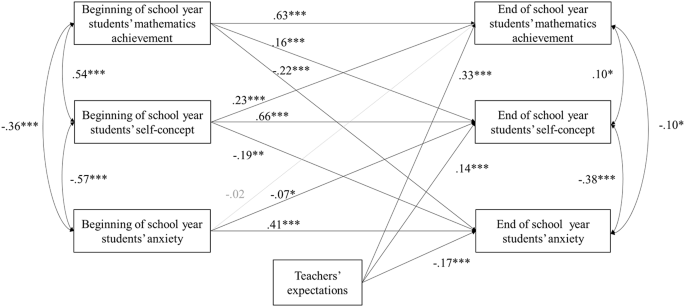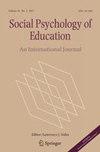Teacher expectations and their relations with primary school students’ achievement, self-concept, and anxiety in mathematics
IF 3.2
2区 心理学
Q1 PSYCHOLOGY, EDUCATIONAL
引用次数: 0
Abstract
Abstract Teacher expectations not only relate positively to student achievement, but also to student beliefs such as their self-concept. Nevertheless, most studies focus on the relations with student achievement, followed by studies on beliefs. Beliefs are a significant determinant of academic success and can include student self-concept or emotions, such as anxiety. The extent to which anxiety can be influenced by teacher expectations has been investigated in very few studies. This paper examined how teacher expectations related to changes in student achievement, self-concept, and anxiety in mathematics within a school year. The data were from a longitudinal study “Outcomes of teacher education”, funded by the Swiss National Science Foundation and based on 28 teachers and 509 primary school students. Teacher expectations were operationalized using the residual approach. Student mathematics achievement was assessed via a standardized mathematics test and their self-concept as well as their mathematics anxiety via a questionnaire. The multi-level structure was considered in the analyses, because the interclass-correlation of student mathematics achievement exceeded the critical value of 10%. The results showed that teacher expectations were positively related to student achievement as well as self-concept and negatively related to anxiety towards mathematics. The change in the explained variance was small (self-concept and anxiety) to large (achievement). The results extend findings on the expectation effect in the classroom, as they focus not only on student achievement but also on student beliefs and are discussed regarding their significance for academic success.

教师期望与小学生数学成绩、自我概念、焦虑的关系
教师期望不仅与学生成绩呈正相关,而且与学生的自我概念等信念呈正相关。然而,大多数研究集中在与学生成绩的关系上,其次是对信念的研究。信念是学业成功的重要决定因素,可以包括学生的自我概念或情绪,如焦虑。很少有研究调查了教师期望对焦虑的影响程度。本文研究了教师期望与一学年学生成绩、自我概念和数学焦虑的变化之间的关系。数据来自一项纵向研究“教师教育的结果”,由瑞士国家科学基金会资助,基于28名教师和509名小学生。使用残差法对教师期望进行操作化。通过标准化数学测试评估学生的数学成绩,通过问卷调查评估学生的自我概念和数学焦虑。由于学生数学成绩的班级间相关性超过10%的临界值,因此在分析中考虑了多层次结构。结果表明,教师期望与学生成绩、自我概念呈正相关,与数学焦虑呈负相关。解释方差的变化从小(自我概念和焦虑)到大(成就)。这些结果扩展了课堂期望效应的研究结果,因为它们不仅关注学生的成绩,还关注学生的信念,并讨论了它们对学业成功的重要性。
本文章由计算机程序翻译,如有差异,请以英文原文为准。
求助全文
约1分钟内获得全文
求助全文
来源期刊

Social Psychology of Education
PSYCHOLOGY, EDUCATIONAL-
CiteScore
5.40
自引率
3.40%
发文量
59
期刊介绍:
The field of social psychology spans the boundary between the disciplines of psychology and sociology and has traditionally been associated with empirical research. Many studies of human behaviour in education are conducted by persons who identify with social psychology or whose work falls into the social psychological ambit. Several textbooks have been published and a variety of courses are being offered on the `social psychology of education'', but no journal has hitherto appeared to cover the field. Social Psychology of Education fills this gap, covering a wide variety of content concerns, theoretical interests and research methods, among which are: Content concerns: classroom instruction decision making in education educational innovation concerns for gender, race, ethnicity and social class knowledge creation, transmission and effects leadership in schools and school systems long-term effects of instructional processes micropolitics of schools student cultures and interactions teacher recruitment and careers teacher- student relations Theoretical interests: achievement motivation attitude theory attribution theory conflict management and the learning of pro-social behaviour cultural and social capital discourse analysis group dynamics role theory social exchange theory social transition social learning theory status attainment symbolic interaction the study of organisations Research methods: comparative research experiments formal observations historical studies literature reviews panel studies qualitative methods sample surveys For social psychologists with a special interest in educational matters, educational researchers with a social psychological approach.
 求助内容:
求助内容: 应助结果提醒方式:
应助结果提醒方式:


